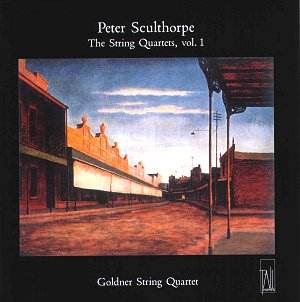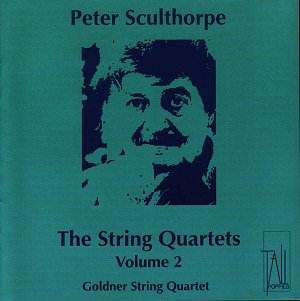Here is something rather special - the string
quartets of Peter Sculthorpe, up to and including the eleventh
of 1990, recorded in the composer's presence by an ensemble who
are totally inside this fascinating music. Previous efforts by
the Kronos and Brodsky quartets notwithstanding, this pair of
discs is indispensable for anyone who regards the 20th
century string quartet as a key element in the lifeblood of their
ongoing personal musical education and experience. Sculthorpe
has a unique way of melding together European, Australasian and
Oriental influences into something which is simultaneously both
strikingly original and reassuringly familiar. This perhaps reflects
the colonial history of his homeland, as did the great and still
undervalued Percy Grainger before him.
The first five quartets, written in the forties
and fifties, remain only as a series of fragments, recorded here
as an appendix to the later quartets on volume 2. The intact No.
6 is an occasionally harsh but predominantly lyrical, if melancholy
work. It has three movements, with lento being the frequent
and operative word used to describe most of its duration. This
is austere but not forbidding music, revealing at this stage a
profound spiritual element that pervades all Sculthorpe's greatest
works (of which I believe there are many). The closing bars of
the piece are a truly cathartic listen. The seventh which follows
is closely related to the Sun Music series and was originally
entitled Teotihuacan after the Mexican pyramid site. Its
single movement structure is a little more abstract than that
of its predecessor yet it is notable for its introduction of glissandi
to evoke birdsong and other sounds of nature - one of the composer's
later trademarks.
The quartet No. 8 represents Sculthorpe's increasing
interest in the sounds of the Pacific Rim with a second movement
based on the music of the "Balinese rice pounding ritual". This
highly rhythmic section is an invigorating listen although it
juxtaposes more contemplative, lamenting viola sounds against
the pizzicato element. After a con dolore central movement,
Sculthorpe then returns to the highly "percussive" sounds of the
first part of the second. I am reminded somewhat of Kevin Volansí
White Man Sleeps but this music is much less upbeat, often
more harrowing, yet gripping nonetheless. The final movement again
is steeped in the "birdsong glissandi" mentioned above. String
Quartet No. 9, also in one movement, provides something of a bridge
to the later, more immediate works featured on Volume 2, with
the faster rhythmic sections approximating more to the less mainstream
figures of American "minimalism" - Lou Harrison? The late Californian
composer was, of course, also much enamoured with the musics of
the Pacific Rim.
I should now mention that volume 1 opens with
two arrangements: the first from the composer's Irkanda
series, in this case the fourth, and the other from his radiophonic
score The Fifth Continent (based around readings from D.H.
Lawrence's Kangaroo novel). The former, like the others
in its set, evokes superbly the meaning of its aboriginal title,
'a remote and lonely place'. This is a concept that has become
increasingly important to Sculthorpe in many of his works in recent
years. Small Town, by contrast, is a gorgeous, gently rocking,
sweet toned piece (arranged by David Matthews). It interpolates
The Last Post, in classic Charles Ives style, and is the
track on this disc which I can relate most directly to Sculthorpe's
often stated indebtedness to Mahler, albeit the Mahler of the
Wunderhorn rather than the Venice lagoon.
Volume 2 opens with the tenth quartet which was
written for the Kronos Quartet and brings together old and new
world influences. It continues the trend to incorporate more overtly
melodic material. Here the analogy with Kevin Volans is, I feel,
more tangible. This is still not easy listening (heaven forbid!)
but the combination of the frenetic but tuneful Sun Songs
and the more serene, if sometimes mildly dissonant Chorales,
makes for a satisfying listen. It shows its composer straddling
the traditions of "indigenous tribal music" and European art music
with equal ease. Oh and, incidentally, the final movement could
almost be entitled "John Adams in Australia" - marvellous, life-affirming
music, one of the very best parts of this pair of discs so far!
This brings us on to the most recent original
work included here, Jabiru Dreaming (Quartet No. 11), which
represents one of the first flowerings of what I would regard
as Sculthorpe's mature or, at least, his current style. Heavily
influenced by the landscapes and peoples of the far north of Australia
and beyond (Torres Strait islanders etc.), this quartet is a companion
piece to From Nourlangie, Into the Dreaming etc.
Notice the use of the word "dreaming" in many recent compositions,
alluding, I would imagine, to the "dreamtime" of the creation
myths of the Aboriginal peoples the composer now draws so effectively
on for his artistic inspirations. The pentatonic dance tunes,
the bird and insect sounds are now in full flow but are used with
total artistic integrity and absolutely not as musical tourism.
This is the sound of a man who has found his true voice, although
even his first efforts went far beyond those of many contemporaries,
in their scope, vision and purity of utterance. If you choose
to buy this disc, and I recommend it wholeheartedly, also consider
purchasing the Brodksy Quartet disc with Anne Sofie von Otter
(Vanguard Classics 99215) which, as well as containing an equally
valid performance of Jaribu, also includes Island Dreaming,
the thirteenth quartet, plus the eighth and many charming shorter
pieces (Maranoa Lullaby is a tiny gem!).
The remainder of the second volume is taken up
with mainly pastoral, even meditative, fragments from the earlier
quartets. They remind us of both his fondness for Mahler and of
the time he spent studying in England (with Rubbra), as well as
his Tasmanian childhood. However, amongst these lies the string
quartet version of the classic Earth Cry which is rather
more animated, albeit in a very melodic way, than its close companions.
Sculthorpe himself describes it as "quick and joyous" with which
I would not disagree. I should also mention the two Hill Songs
which contrast with and complement Percy Grainger's pieces of
the same name perfectly. While Grainger was thinking of bagpipes,
Sculthorpe is in idyllic mode. Like virtually everything else
I have ever heard by this composer, I find these discs recommendable
without reservation. I encourage all readers to make their acquaintance
at any opportunity. Here is a genuine and important voice. Exceptional.
Neil Horner

